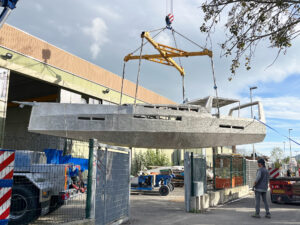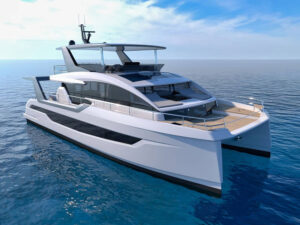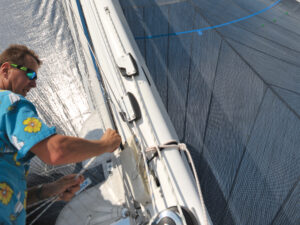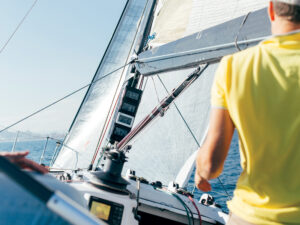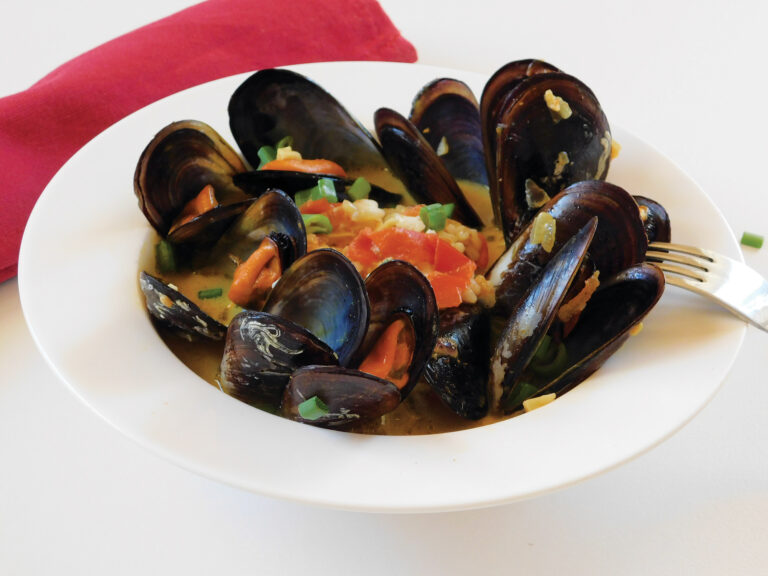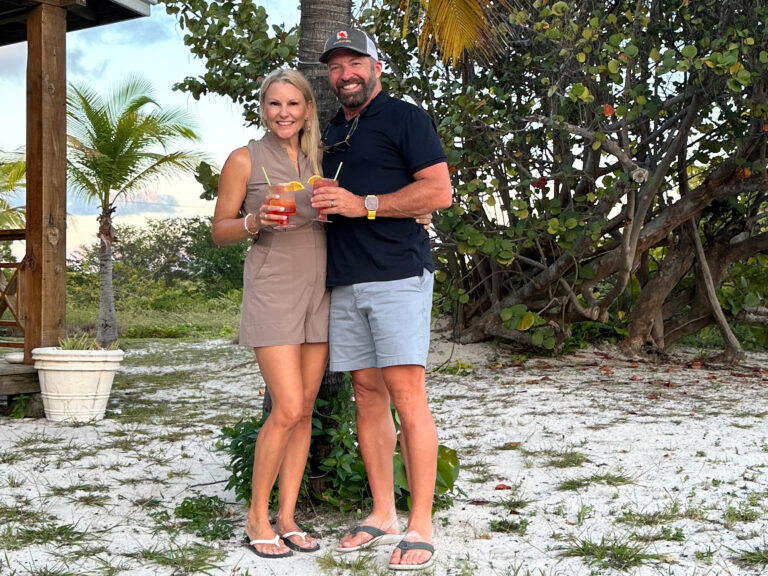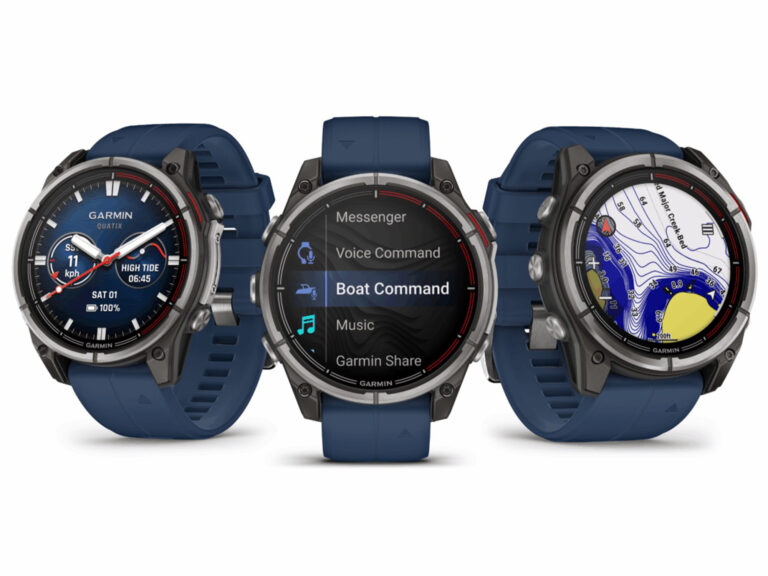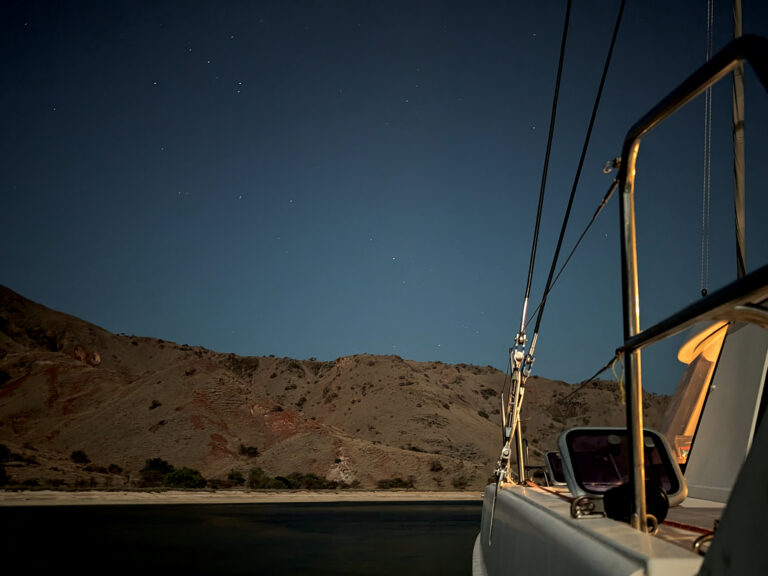
A common benchmark of cruising expertise is number of miles at sea. It was the kickoff question to start up the Let’s Talk Sailing! panel with a spectrum of sailors – mostly cruisers – at our Annapolis meetup during the show (So.Much.Fun!).
Mileage is a sensible way to provide context to backgrounds – or is it? It offers experience context but largely this proficiency proxy is a myth: the mileage myth. Distance sailed is a measure of enjoyment or fortitude, not a certification of expertise in the myriad of skills that make up cruising.
Supporting sailing dreams is important to us, and in Annapolis we worked to reinforce ways to help ease the path to cruising, rather than make it feel more remote. Mileage can be aspirational, but also intimidating. Putting those factors together, and we generated a few ways for sailors to build important foundation skills that don’t involve banking a bunch of miles.
Weather
Least appreciated during cruising prep, and yet most critical to our everyday comfort and safety: weather errors are a major cause of bad days and dreams terminating. A few months ago, we watched as an unusually large, low, dark cloud formed over the bay near our anchorage off La Cruz, Mexico. G’bye shoreside plans: time to hustle back to Totem! Passing new cruisers as we fast-walked to the dinghy dock, we asked if they thought it might rain. “Our weather app says 7% chance,” they replied, continuing on as if weather took direction from the forecast. But weather is dynamic, forming and changing imperfect predictability.
Jamie breaks down are three steps to building marine weather smarts. First, learn weather theory and fundamentals, like – what makes wind? For this, crack the books. Second, learn and understand weather forecast tools, such as GMDSS text forecasts, GRIB forecasts, etc. – and know the difference between the data (such as the GFS model) and the viewer (such as PredictWind’s Offshore app). Third, apply the first two! Even if you’re looking at the water instead of on it, you’ll gain a richer understanding of what it’ll be like if you choose to leave the dock. The forecast may only show four-foot waves, but remember when a similar forecast was very uncomfortable be the waves were steep sided and confused?

Mechanical aptitude
Cruisers end up needing to diagnose or repair rigging, sails, diesel engine, electric motors, steering system, electrical issues, and everyone’s favorite, toilet issues – it’s probably a good idea to have at basic knowledge of some of those systems, even if you’re all thumbs. It’s intimidating, and we definitely started behind the curve. Starting with reliable systems helps. YouTube has made it easier. Classes are an option. Another winner: be That Person who asks their dock neighbor to tag along for oil changes, rig inspections, solar panel installation, or winch servicing. You’ll be more ready to troubleshoot when the ice machine breaks!
Medical training
Sailors preparing to go cruising sometimes have nightmares imagining what-if medical disasters, and confidence gained through courses may abate that stress while imparting important knowledge. CPR and First Aid are a first step; offshore or wilderness training preferred. As important as tech skill is the softer side of responding to medical and emergency situations. As we learned from Dr. Curtis Edwards: “first, stop and take your own pulse,” a revered quote on Totem. Reasoned rather than hasty, it demands slowing long enough to say, “yes, I will clip-in before going to the aft deck to fix the towed dinghy.” The alternative could bring a real nightmare.
Where to turn? Check out WildMed’s Offshore Emergency Training (gets raves), but if it’s less accessible to you, Wilderness First Responder training in general is a good proxy for important skills when a medical event can’t be addressed through nearby emergency services. Empowered through knowledge, the nightmares abate, and the skills are real.
Woof, woof
Online forums seem to attract the salts who qualify responses to newbie questions with their miles sailed, as if expertise was implied. Who dares challenge the big dog? Perhaps only “I’ve got 200,000 miles” will shrink the 100k mastiff to chihuahua – meanwhile, we know circumnavigate I wouldn’t want to sail across a lake on a mild day with! And what is it with the temptation of cruisers and fishermen to inflate their claims, and every coastal cruiser claims “we’re sailing around the world!” anyway? We’re averse to even the appearance of big dog pretensions. At the end of the day, mileage is a flawed yardstick of cruising competency. As hopeful cruisers start to tick up their own miles, whether for enjoyment or through persistence, opportunity to develop skills to make life on the water better are endless– and it doesn’t matter if the big dog is barking at chihuahuas.

